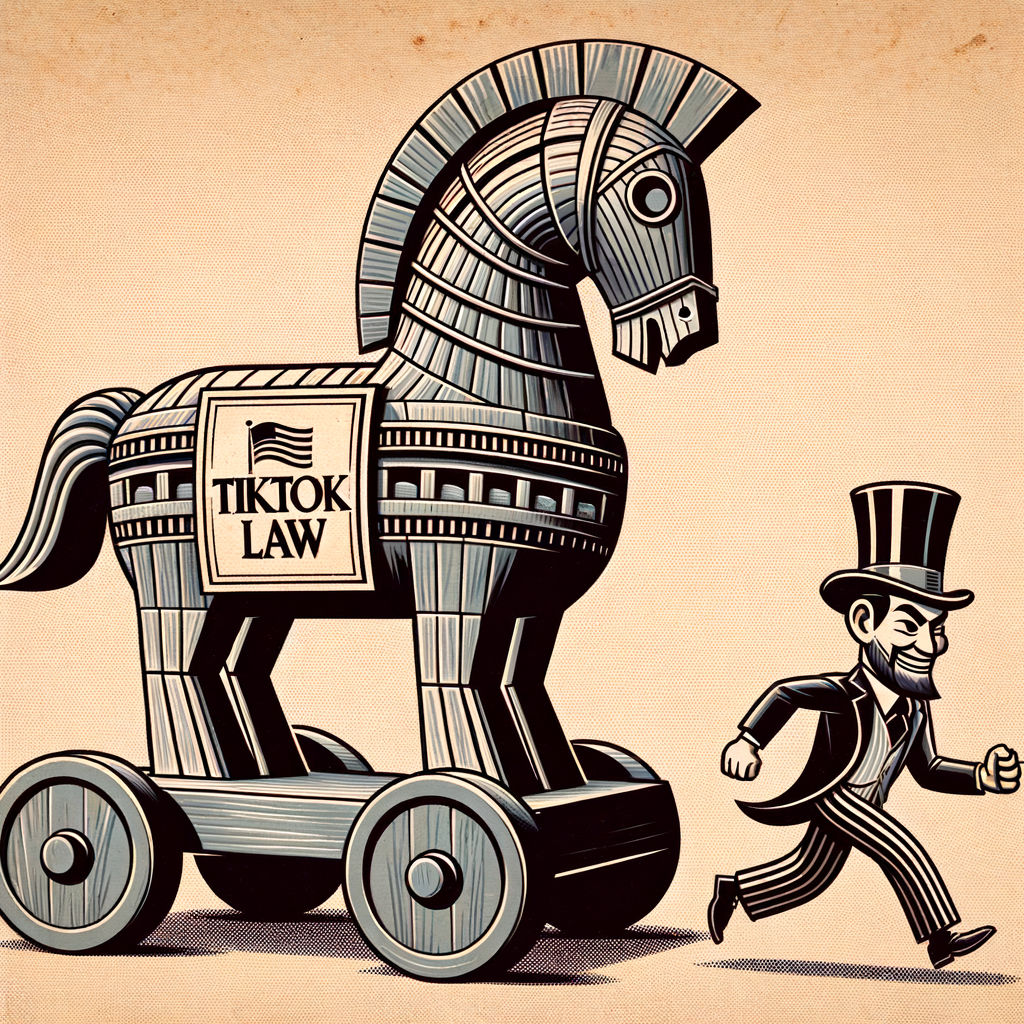A new piece of legislation with the Orwellian title “Protecting Americans from Foreign Adversary Controlled Applications Act” recently passed in the House of Representatives.
On Wednesday, March 13, 2024, the act passed with a lot of support from both Republicans and Democrats in the House, getting 352 votes in favor versus 65 against.
Conversations about the controversial bill are trending on Twitter, with the hashtags:
#PAFCA
#TikTokBan
Another “dumbed-down” name on a piece of legislation, designed to mislead the public about the true meaning of the bill?
In recent years, legislators have adopted a practice of giving acts simplistic, dumbed-down names that can conceal the true meanings contained in the lengthy bills’ complex legal language. With a public that often only has the attention span for headlines, not entire bills, these names may be deceptively designed to garner surface-level support while obscuring controversial details.
Despite its protective-sounding name, many are concerned this act could actually be used to limit Americans’ free speech online, especially during this consequential 2024 election year.
The act purports to prohibit distributing, hosting, or providing internet services for applications that are controlled by countries considered “foreign adversaries” to the United States.
Companies like TikTok, which is controlled by the Chinese company ByteDance, would likely be impacted.
Does the vague language of the bill signal sinister intent?
However, the wording used in the law is pretty vague. It allows the president to determine what companies are controlled by “foreign adversaries” and what counts as a “significant threat to national security.” This worries some people, who think the vague language could be taken advantage of. They are concerned it gives the government too much power to decide which internet apps and websites Americans can use or not.
There are fears the law could be twisted to censor apps, websites and online platforms that allow free speech the government doesn’t agree with, under the excuse of “national security.” With the 2024 presidential election coming up, some are suspicious the real intent could be to limit criticism of the administration and suppress certain political viewpoints online.
Votes for and against the bill
Republicans: 15 Republican members of Congress voted against the bill to ban TikTok. Most of these “no” votes came from the Freedom Caucus, a conservative group. Some notable Republicans who voted no included Representatives Marjorie Taylor Greene, Thomas Massie, and Matt Gaetz.
Interestingly, “YES” votes on the bill included: Boebert, Comer, Donalds, Jordan, Nehls, and Stefanik.
Democrats: 50 Democrats also voted against banning TikTok. These no votes came from both establishment, mainstream Democrats as well as more progressive/liberal members. A few prominent Democrats voting no were Representatives Jim Clyburn, Jahana Hayes, and John Larson.
It seemed the reasons for voting against differed between parties. The Freedom Caucus Republicans may have worried the bill could be misused as a “Trojan horse” to potentially ban other sites like Twitter if the administration falsely claimed its owner Elon Musk was connected to Russia, in an effort to limit free speech on Twitter during an election year.
The Democratic no votes, from both mainstream and progressive members, may have been influenced by Chinese interests lobbying against the ban. Or they could have simply felt banning TikTok would hurt their ability to reach and influence younger, more liberal voters who use the app.
Points of view by some who oppose the bill
One Twitter user argued, “They will say X is controlled by a ‘foreign adversary’, by claiming Elon Musk is controlled by Putin, as an excuse to censor X, because it is empowering free speech they want to suppress.” This suggests a concern the law could be used as justification to ban platforms like X (formerly Twitter) by falsely accusing the owners of being influenced by “U.S. adversaries like Russia.”
X/Twitter user Logical Phallacies (@Lphallacies) wrote: “So the president has authority to deem any foreign application a “Foreign Adversary Controlled Application” by means of national security?”
X/Twitter user Michael Tracey (@mtracey), who calls himself a “Roving Journalist” in New York City, wrote: “The literal sponsors of the bill openly brag that its whole purpose is to ban TikTok. The forced divestiture thing is a pretext to impose their desired censorship.”
There are also worries about whether banning apps and websites based on this law would violate the First Amendment’s protection of free speech. The digital rights group @DigitalProInst has looked into the potential constitutionality issues.
While the stated purpose of the law is to protect data privacy and prevent foreign influence operations, critics like the user @SJonesWasTaken have voiced skepticism: “Does anyone really believe this has anything to do with protecting us?” They imply the real motive may be limiting what narratives and viewpoints can be expressed online.
X/Twitter user Dwayne Robertson (@PalmettoHawk) said: “Facebook is more an enemy to free speech & harvests data from people constantly. How about leaving people alone and let them decide what they want or don’t want.”
Groups like @FreedomWorks that advocate for civil liberties argue the law “sacrifices our right to communicate freely” under the guise of security. They seem to believe the ability of Americans to share information and perspectives online could be severely restricted by the new bill.
X/Twitter user david pinto (@ding_guy) wrote: “I stopped reading the bill after “Protecting”.. they always do the opposite.. Controlling”
Supporters of the bill
The bill was supported by “Heritage Action”, @Heritage_Action on X/Twitter, an affiliate of the Heritage Foundation in Washington ,D.C., who said: “As long as TikTok continues to operate under the ownership of ByteDance in the United States, it enables a foreign adversary to collect information on U.S. citizens and strengthens China’s ability to exploit Americans. TikTok’s proven national security threats cannot be addressed while ByteDance—a Chinese company answerable by law to the Chinese Communist Party (CCP) and Chinese intelligence services—remains its owner. Worse, with 63%of teens ages 13 to 17 saying they use TikTok, this foreign influence is targeted at our youth. H.R. 7521 provides immediate protection against the CCP’s relentless surveillance and mal-influence of our citizens through TikTok and proactively addresses the next attempt by a foreign adversary to do the same.”
Congresswoman Kat Cammack (R-FL) joined a bipartisan group introducing the Protecting Americans from Foreign Adversary Controlled Applications Act. Cammack teamed up with lead sponsors Reps. Mike Gallagher (R-WI) and Raja Krishnamoorthi (D-IL) of the House’s China competition committee, along with other Republican and Democratic co-leaders. In her statement about the bill, Cammack highlighted national security risks from adversary-owned tech, accusing China of using TikTok data to develop AI and sway U.S. opinion. The congresswoman, serving on tech policy committees, welcomed the bipartisan push to counter “malign influence” and protect Americans’ rights and privacy.
AFP Government Affairs (@AFPGovAffairs on X/Twitter), calling itself a “Grassroots ️D.C.” organization, said it was “proud” to “lead a coalition with 7 other prominent organizations in support of H.R. 7521, the Protecting Americans from Foreign Adversary Controlled Applications Act.”
“This legislation represents a sophisticated and targeted response to a genuine national security threat while avoiding unnecessary entanglements or repercussions for tech platforms and companies.”, they said.
AFP further said, “Next up, over to the other side of the Hill where it looks to be smooth sailing.”
Support from the Committee on Energy and Commerce
The Committee on Energy and Commerce, a legislative committee in the U.S. House of Representatives, released a statement where numerous figures spoke in favor of the bill:
Speaker of the House Mike Johnson:
“I support the bill…It’s an important bipartisan measure to take on China, our largest geopolitical foe, which is actively undermining our economy and security.”
Brent Gardner, Americans for Prosperity:
“We would never want the U.S. federal government to have the power to censor, surveil, and manipulate Americans—we absolutely should not permit that abuse of power by the Chinese government through TikTok.”
Kara Frederick, Heritage Foundation:
“The Act is a crucial step forward in this fight and will be a powerful tool in our arsenal to put an end to this noxious, CCP-beholden surveillance platform once and for all.”
American Free Enterprise Chamber of Commerce:
“AmFree strongly supports HR 7521 addressing critical risks from TikTok due to CCP control.”
Ryan Walker, Heritage Action:
“TikTok is a dangerous tool used by the CCP to spy on, exploit, and mislead the American people. The Act is an important step toward addressing the root problem.”
Robert O’Brien, former National Security Advisor:
“We cannot allow the Chinese Communist Party…to control the platform that America’s youth overwhelmingly relies on for news.”
Adam Savit, America First Policy Institute:
“TikTok must be required to divest from its CCP parent company ByteDance to remain in the U.S. This act would neutralize the threat.”
Brendan Carr, FCC Commissioner:
“I applaud this strong bipartisan bill, which would definitively resolve this threat.”
Mike Pence, former Vice President:
“This legislation is one of those necessary steps, and Advancing American Freedom urges Congress to move this legislation quickly.”
Rebeccah Heinrichs, Hudson Institute:
“The CCP’s control of TikTok must come to an abrupt end. This bill is narrow and direct. It’s a sniper rifle.”
Zach Graves, Foundation for American Innovation:
“Congress is taking a huge step toward stronger protections for the American people from the threats posed by CCP-controlled entities like TikTok.”
Real concerns remain about a potential sinister intent to use this law to suppress free speech in an election year.
As the legislative process moves over to the Senate, the debate continues to rage over whether this law is truly about national security, or if it creates an avenue to censor free expression leading up to the consequential 2024 election. Proponents insist it is simply protecting Americans’ private data from foreign adversaries. But opponents strongly worry the vague language could lead to a crackdown on the open internet and people’s ability to voice their views freely online, especially dissenting political opinions.
Does the bill have the right idea – banning TikTok to protect Americans, especially American youth, but is the language too vague, potentially allowing biased incumbents to supress free speech in an election year, in a disingenuous way?
While the stated goals of protecting national security and shielding Americans from malign foreign influence seem reasonable, civil liberties advocates raise valid concerns about the act’s ambiguous phrasing. The definition of what constitutes a “foreign adversary” or “significant threat” is open to potentially biased interpretation by the administration.
Critics argue this vagueness creates a slippery slope where the law could be abused to censor online platforms under the pretext of security concerns, but truly as a means to stifle dissenting political speech inconvenient to those in power. In a heated election cycle, the fear is incumbent officials could wield such an overly broad statute to suppress voices and narratives opposing their agenda.
Congressman Chip Roy (R-TX), a co-sponsor of the bill, countered these worries by stressing the language “cannot be used to target or censor Americans on any platform.” However, digital rights groups remain skeptical about such assurances given past precedents of civil liberties being eroded under the guise of national security.
As the bill moves to the Senate, lawmakers will have to carefully weigh the tangible risks of foreign adversary influence against the preserving of Americans’ fundamental free speech protections online. Achieving that balance through precise wording will be crucial to ensuring the law fulfills its stated purpose without opening Pandora’s box for potential overreach and censorship, especially in this consequential election year.
Many will be watching nervously to see how senators interpret the law’s true intentions and impacts on civic rights.
With so much modern discourse happening over apps, websites and social media, the implications of who controls what flows of information could be profound in shaping the national conversation during election season. Many are watching nervously to see how senators interpret the law’s true intentions and impacts on civic rights.
Sources:



